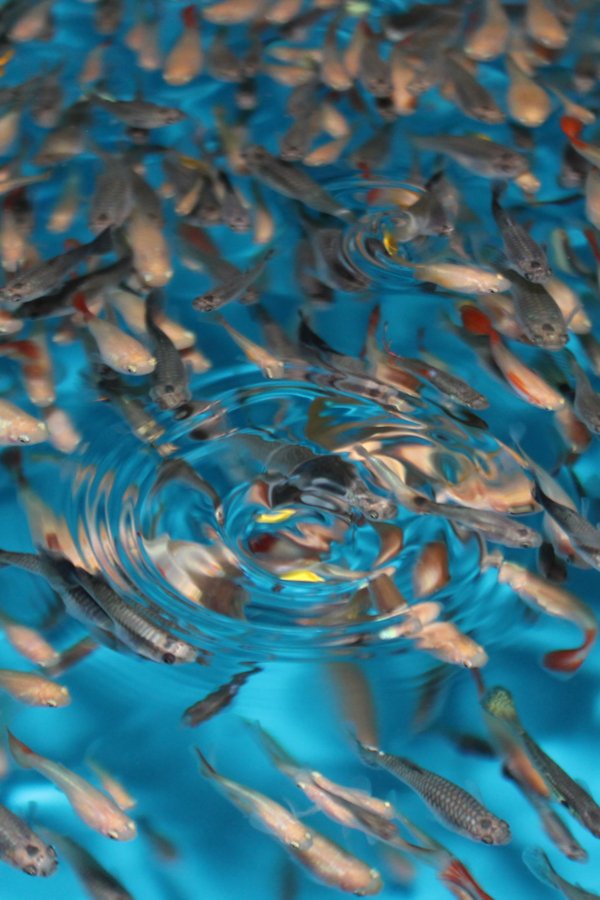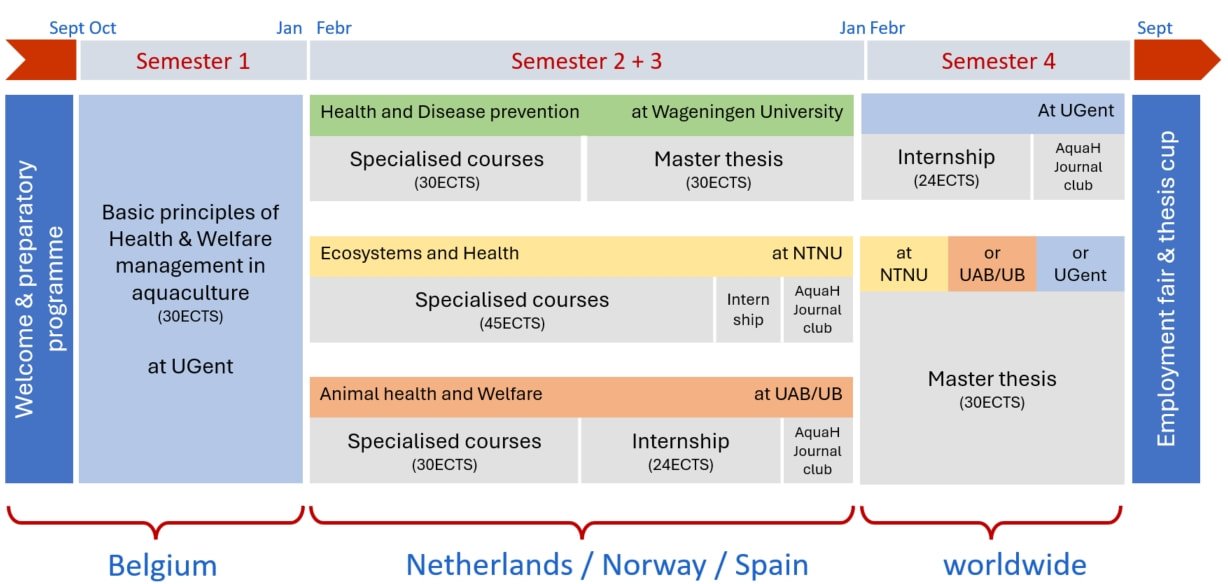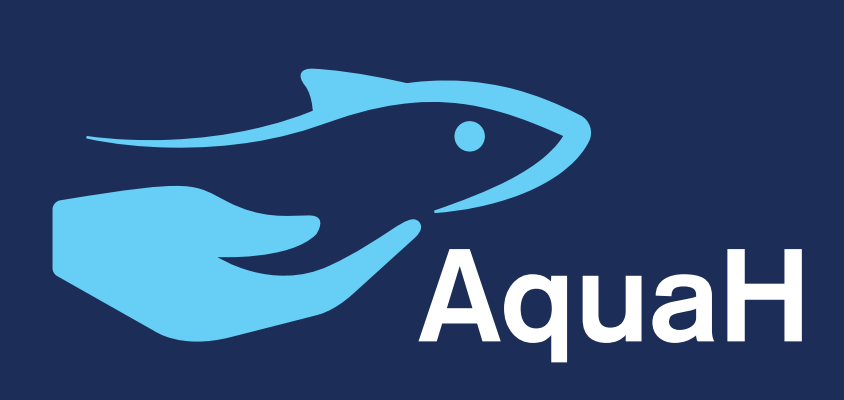Programme
Programme objective
The AquaH programme delivers graduates able to accurately analyse and resolve animal disease issues that are increasingly impacting aquaculture farms. AquaH graduates are knowledgeable of the current and most appropriate measures to optimise health and welfare management and can design novel approaches to prevent diseases. They are trained to approach aquaculture issues taking a broader One Health view. AquaH graduates are proficient to operate either as researcher in an academic context, as self-employed consultants, as governmental policy makers/implementers or as R&D officer in aquaculture businesses.
Structure
The programme consists of 4 semesters:
- ‘Ecosystems & Health’ at NTNU, Trondheim
- ‘Health and Impact on the environment’ at Wageningen University
- ‘Animal Health and Welfare’ at Universitat Autonoma Barcelona & Universitat de Barcelona
The 4th semester is dedicated to thesis research that can be performed at one of the 4 consortium partners or associate partners

Schematic overview of the programme:

Learning paths
Basic principles of Health management in aquaculture
Ghent University, Belgium
Ecosystems & Health
NTNU, Trondheim, Norway
Health and impact on the environment
Wageningen University, The Netherlands
Animal Health and Welfare
Universitat Autonoma Barcelona & Universitat de Barcelona, Spain
Thesis research
Basic principles of Health management in aquaculture
Ghent University, Belgium
This module is structured around courses that provide participants with a comprehensive foundation in aquaculture health principles, techniques, and challenges. It covers basic aspects of health management, such as disease management, virology, microbial management, and immunology, and is taught by Ghent University experts from the Faculty of Bioscience Engineering, Faculty of Veterinary Medicine and Faculty of Sciences. Several invited speakers further enrich the in-house teaching, offering diverse perspectives and expertise.
Ecosystems & Health
NTNU, Trondheim, Norway
This learning focuses on the interaction between aquaculture practices, ecosystems and fish health. Courses focus on health and welfare of fish in aquaculture operations, design and management of sustainable recycling aquaculture systems, methods to address environmental challenges in aquaculture, exploring the interactions between aquaculture practices and the surrounding environment and training in the ethical use of fish in research.
This module starts with a 2-days visit to aquaculture companies and stakeholders at the coast of central Norway. In this visit the students experience current aquaculture production technologies and challenges experienced by the industry. Finally, the students get possibility of practical experience through placement in a relevant aquaculture company or organization.
Health and impact on the environment
Wageningen University, The Netherlands
This learning focuses on the sustainable production of aquatic organisms while addressing the interconnected challenges of fish/animal health, environmental impact, and food security. Students will develop expertise in designing ecologically, economically, and socially sustainable aquaculture systems, with a strong emphasis on circularity and resource efficiency. A key component is understanding how nutrition influences health and disease resistance, enabling students to develop strategies that enhance immune responses and reduce dependency on antibiotics, including the use of innovative tools such as next-generation vaccines.
This learning track integrates cutting-edge research with practical applications, preparing graduates to contribute to resilient and environmentally responsible aquaculture practices.
Animal Health and Welfare
Universitat Autonoma Barcelona & Universitat de Barcelona, Spain
In this track students focus on fish and aquatic animals’ health and welfare, based on the physiology and pathology of aquaculture species, the interaction between aquaculture and environment in terms of its consequences of fish health, the prevention, prophylaxis and treatments of fish against diseases. In this track, emphasis will be put on the welfare aspects of fish, including the scientific evidence of stress and pain, critical welfare points such as transport, crowding and stunning, behaviour of the concerned species, and experimental and operational welfare indicators. As well as the different ways for culturing aquatic species will be addressed, in order to be able to focus on effective sustainability of the sector and its relation to the market and human safety.
Thesis research
The thesis is the culmination point of the programme as it requires the students to integrate previously acquired knowledge and competences, independently plan and carry out experimental work, analyse and discuss results in a sound scientific matter, harness generic skills such as co-working, visualising concepts, presenting and publicly addressing an audience.
Students select a research topic of their interest from a list compiled by all AquaH partners and the large network of associated partners*. They formulate a research hypothesis and resolve it through field work, laboratory analysis, desktop calculations and any other appropriate method. They present final results in written form (thesis) and defend their thesis orally for an audience of supervisors, independent reviewers and fellow students.
* for students following the WU track thesis is compulsory at WU
Detailed programme
Semester 1
Circular societies
Ghent University
Circular societies
Ghent University
Semester 2 & 3
& Universitat de Barcelona, Spain
| Semester | Course | ECTS credits |
|---|---|---|
| 2 | Fish welfare and health | 7.5 |
| 2 | Experts in Teams | 7.5 |
| 2 | Environmental Biotechnology | 7.5 |
| 2 | Recirculation Aquaculture Systems | 7.5 |
| Total semester 2 | 30 | |
| 3 | Internship project | 7.5 |
| 3 | AquaH Journal club | 7.5 |
| 3 | Aquaculture and the Ecosystem | 7.5 |
| Optional courses (choose for 7,5 ECTS) | ||
| 3 | Laboratory Animal Science for Researchers | 7.5 |
| 3 | Environmental assessment methods and quality of coastal water | 7.5 |
| Total semester 3 | 30 |
| Semester | Course | ECTS credits |
|---|---|---|
| 2 | Nutrition and Health in Aquaculture | 6 |
| 2 | Frontiers in Animal Health | 6 |
| 2 | Academic Consultancy Training and MOS modules | 12 |
| Optional courses (choose for min 6 ECTS) | ||
| 2 | Sustainability in Fish and Seafood Production | 6 |
| 2 | Laboratory Animal Science: Design and Ethics in Animal Experimentation | 3 |
| 2 | Short Research Projects in Biology | 6 |
| Total semester 2 | 30 | |
| 2 | Internship comprehensive project | 24 |
| 2 | AquaHealth Journal club | 6 |
| Total semester 3 | 30 |
& Universitat de Barcelona, Spain
| Semester | Course | ECTS credits |
|---|---|---|
| 2 | Internship comprehensive project | 22,5 |
| 2 | Fish Health Laboratory course | 2 |
| 2 | Fish Laboratory course | 2 |
| 2 | Basic marine aquaculture facility management | 2 |
| Total semester 2 | 28.5 | |
| 3 | AquaHealth Club | 7.5 |
| 3 | Production and health management in aquaculture facilities | 8 |
| 3 | Stress, pathology, immune response, and environmental health | 8 |
| 3 | Physiology of aquaculture species | 8 |
| Total semester 3 | 31.5 |
Semester 4
| Semester | Course | ECTS credits |
|---|---|---|
| 4 | Master dissertation (thesis) | 30 |
Learning outcomes
- Possess a broad knowledge at an advanced level in essential disciplines underpinning health management in aquaculture (immunology, applied microbiology, virology…)
- Integrate knowledge of fish and shellfish (micro)-biology, immunology, genetics and (viral) diseases in the use of aquatic organisms in aquatic production systems.
- Design and implement strategies for innovative health management in aquaculture.
- Design a research plan in which the problem definition, hypothesis, research objectives and research questions are described in relation to relevant literature.
- Acquire a scientific approach to formulate and test hypotheses to design research protocols, and to collect and analyse data.
- Discuss and defend your viewpoints and conclusions in a professional and academically correct way.
- Acknowledge and endorse ethical issues in science research.
- Understand the ethical issues of animal production and experimentation.
- Interact with peers, with various stakeholders in the aquaculture sector, and with the other societal stakeholders concerning personal research, thoughts, ideas, and research proposals, both written and orally.
- Understand how infectious diseases develop and spread in populations, as well as general principles and measures to prevent the introduction and further spread of infectious agents.
- Evaluate the consequences of technological, ecological, economic and social aspects of how the environment and the ecosystem affect fish health, welfare and environmental issues from larval to adult stages of fish on marine fish farming and aquaculture.
- Design ecologically, economically, and socially sustainable production systems of fish and other marine organisms in a global perspective in circular aquaculture systems.
- To evaluate critically – with knowledge of the influences of nutrition on health and feed improvement disease resistance – which strategy needs developing to activate the immune system and use innovative tools such as generation vaccines.
- Understand underlying processes of stress response, the innate and adaptive mechanisms of immune defences, the regulatory systems involved, infections patho-physiological responses in aquatic organisms.
- Understand how to influence physiological mechanisms and use that knowledge to develop tools improving health of fish and shellfish.
Having successfully completed the AquaH programme, you will master the following transferable and soft skills:
- Read, use and reference published work of others, in an appropriate manner.
- Find and critically use online information as a means of communication, and as a source of information.
- Collaborate in an interdisciplinary and international team with respect for gender and cultural diversity.
- Continue to develop the skills necessary for self-managed and life-long learning.
- Identify and work towards targets for personal, academic and career development.
- Develop an adaptable and flexible approach to study and work.
- Use English as lingua franca in science but recognise worldwide diversity in the use of English, which will enhance her/his communication skills.
- Be aware that other languages are used in Europe and recognise the value of cultural diversity in Europe and worldwide.
- Endorse gender equality by experiencing study and working activities.
- Identify themselves as open- minded citizens of the world.
